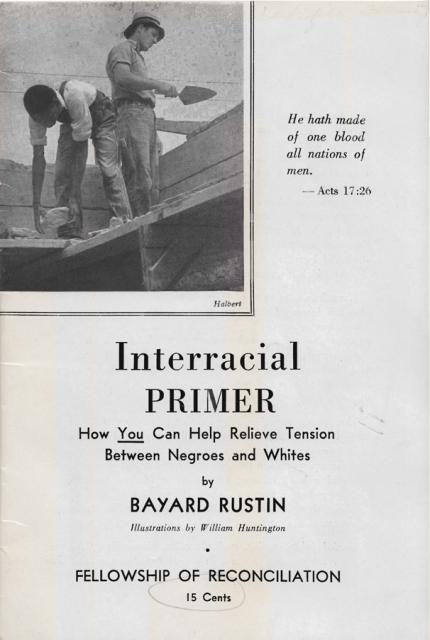Bayard Rustin
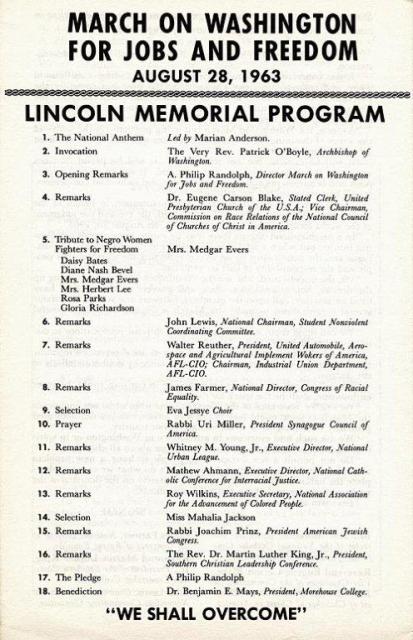
The pacifist project for which Rustin is
most well-known is the 1963 March on
Washington, which he organized largely
under his own direction, although officially
he reported to A. Phillip Randolph. Three
weeks before the scheduled date of the
March, Southern Dixiecrat Senator Strom
Thurmond denounced Rustin from the
floor of the Senate by declaring that the
leader of the March was a sexual pervert.
By this time Rustin had convinced the
supporters of the March that he could
accomplish it. As a result, Rustin managed
to keep his job and carry the March
through to its triumphant completion.
Permission from the Estate of Bayard
Rustin
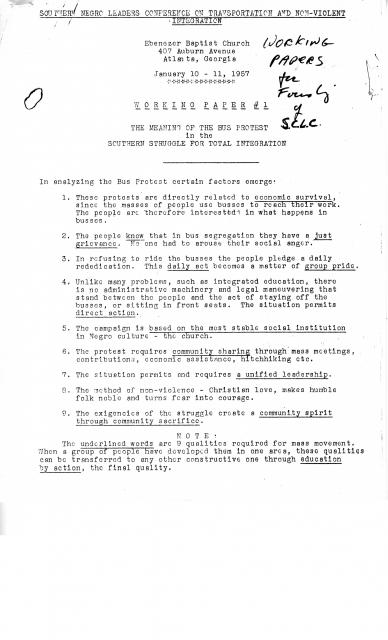 The Montgomery bus boycotts ended in
The Montgomery bus boycotts ended in
December 1956 when the United States
Supreme Court ruled that segregated seating
in city buses was illegal. Immediately Rustin
put his attention to institutionalizing the
kinds of efforts that had made the
Montgomery boycotts succeed. He traced the
boycotters’ success to their development of a
program for action and their insistence on a
pacifist strategy of non-violent direct action.
The written product of Rustin’s efforts at
institutionalization were the 7 Working
Papers for the entity that would become the
Southern Christian Leadership Conference. In
these Working Papers, Rustin envisaged an
organization that would challenge racism and
poverty, as well as assert workers’ rights
under the leadership of the black Southern
church. The Working Papers were endorsed by
Dr. Martin Luther King, Jr.
Working Paper #1 (PDF)
Permission from the Estate of Bayard Rustin
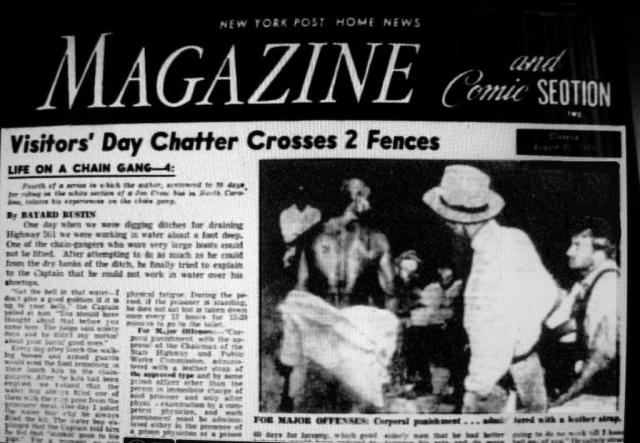
Credit: New York Post
Like his fellow prisoners on the North Carolina chain gang, Rustin dug holes in the earth one day, and the next day he re-filled them. He worked on road projects that seemed never-ending. Rustin also gathered data from his fellow prisoners about their educational levels, employment backgrounds, and previous arrests and incarcerations. He made detailed mental notes on the torturous punishments meted out arbitrarily by guards, as well as the petty signs of deference the guards demanded of the prisoners. He wrote down the lyrics to work songs made up spontaneously by the chained crewmembers. Released in twenty-two days for good behavior, he drafted a five part series for the New York Post titled “22 DAYS ON A CHAIN GANG.” The series’ grinding recapitulation of day-to-day details, combined with Rustin’s recommendations for change, led to the abolition of the chain gang in North Carolina.
A Report on Twenty-Two Days on the Chain Gang at Roxboro, North Carolina by Bayard Rustin (PDF)
permission from the Estate of Bayard Rustin
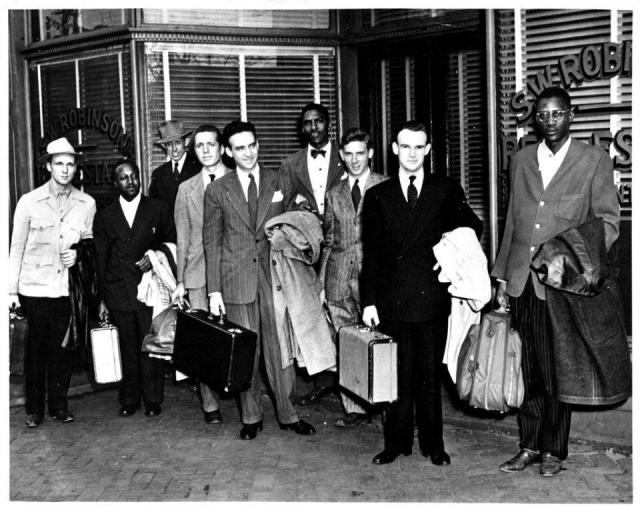
Permission from the Estate of Bayard Rustin
Immediately after his release from federal prison in June 1946, Rustin plunged into to planning a test of the enforcement of a U.S. Supreme Court decision, Irene Morgan v. Virginia 328 U.S. 373 (1946). Rustin recruited sixteen black and white men who would sit in interracial pairs in the white front and the black rear sections of buses that would leave Washington D.C. headed for Richmond, Virginia, during April 1947. The trip, named The Journey of Reconciliation, is now known as the first Freedom Ride. On a final stop in North Carolina, police arrested Rustin and two of the white Freedom Riders, and a judge sentenced them to a chain gang.
Full Report on the Journey of Reconciliation, including title page typed (PDF).
Permission from the Fellowship of Reconciliation and the Beinecke Rare Book Library of Yale University
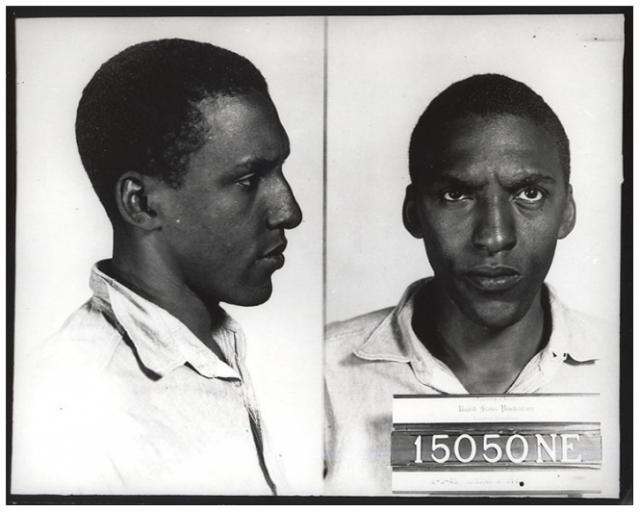
Photo credit: National Archives
Rustin was arrested in 1944 for refusing to join the U.S. Army. While imprisoned at a federal penitentiary in Kentucky, he organized other imprisoned conscientious objectors to engage in hunger strikes in order to desegregate the dining hall, recreation areas, and the chapel. A highly trained musician, he worked with as many as fifty other prisoners to present operettas in the prison. A former WPA school teacher, he taught civics to mixed race classrooms of prisoner-students during his twenty-eight months of incarceration.
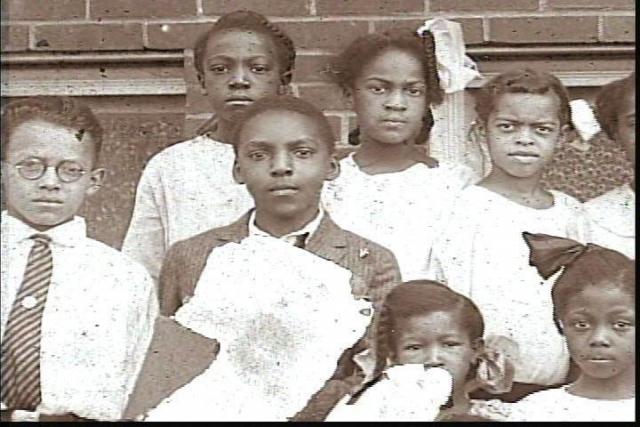
Photograph courtesy of the Chester County, Pennsylvania, Historical Society
Bayard Rustin, an African American, was raised a Quaker by his grandparents after his mother ran away when Rustin was ten days old. Rustin augmented his childhood familiarity with Quaker principles by engaging daily in Quaker meditation beginning in his twenties and dedicating himself, through committee work and peace testimony, to the principles of respect for every human being; non-violence in one’s behavior; and assertion of one’s own dignity. During his twenties, Rustin further reinforced his understanding of Quakerism by traveling as a volunteer throughout New York State teaching pacifism for the American Friends Service Committee.
In 1941, Rustin deepened his
engagement with pacifism by taking a
full-time job with the Fellowship of
Reconciliation (FOR), an interfaith
international anti-war organization. As
field secretary, Rustin was tasked to
work toward the Organization’s newest
antiwar goal, namely to forestall the
outbreak of racial warfare inside the
United States. Rustin traveled the US—
including the South—giving workshops
on race relations, conscientious
objection, and civil disobedience and
non-violence to black citizens. In the
early 1940s he wrote an “Interracial
Primer: How You Can Help Relieve
Tensions Between Blacks and Whites.”
The pamphlet set forth what would
become a few of Rustin’s characteristic
political themes, by calling for social
accountability from each American, by
valuing work in itself, and by viewing the
workplace as one of the most important
situations where racial tensions must be
alleviated.
Read the Interracial Primer (PDF)
Permission from the Fellowship of
Reconciliation

